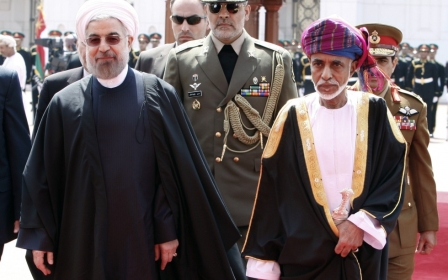Iranian foreign minister reports 'progress' in nuclear talks

Iranian Foreign Minister Mohammad Javad Zarif said progress has been made in talks with EU diplomatic chief Catherine Ashton over his country's disputed nuclear programme, in comments made to reporters at a meeting of the Non-Aligned Movement in Algeria on Thursday.
"We have made progress; we exchanged views during lengthy discussions that we have had in the last two days in Istanbul with Catherine Ashton," Zarif told reporters in Algiers.
"Iran is determined to find a solution that respects the rights of the Iranian people and also clear up any misunderstandings about the sites of the Iranian nuclear programme," he added.
"It's a matter of time, but also political will must be expressed to reach an agreement. I can assure you the other party has the political will to reach an agreement.”
Iran denies seeking nuclear weapons and says it has a right to an independent atomic energy programme. Israel and members of the US Congress have warned against lowering the pressure on Tehran, after an interim deal struck in November with the P5+1 powers limited its nuclear programme in exchange for relief from crippling economic sanctions.
Stay informed with MEE's newsletters
Sign up to get the latest alerts, insights and analysis, starting with Turkey Unpacked
Zarif met with Ashton for two days of talks in Istanbul on 26 May, after meetings in Vienna earlier this month produced “no tangible progress”. Talks are due to resume on finding a permanent agreement between 16 and 20 June in Vienna, ahead of a 20 July deadline to strike a deal that the Iranian president says can still be reached.
“The signs that we have been receiving in the last few days are telling us we are very likely to come to an agreement by the end of July,” Hassan Rouhani told reporters in Shanghai on 22 May. “We can achieve this,” he added.
Meanwhile poor relations between Iran and regional rival Saudi Arabia appear to show signs of improving, after Riyadh invited Tehran to attend a meeting of the Organisation of Islamic Cooperation due to take place in Jeddah on 18 June.
Iran’s Deputy Foreign Minister Hossein Amir Abdollahian welcomed the “friendly gesture” and said an exchange of visits by Saudi Foreign Minister Saud al-Faisal and Zarif was high on Tehran’s agenda, in comments to local daily Etemad on Thursday.
On 13 May Faisal extended an invitation to Zarif saying he would be welcome to visit Riyadh “anytime he sees fit”.
“We are ready to receive him, we will talk with them,” Faisal sad. “Our hope is that Iran becomes a part of the effort to make the region as safe as possible,” he added.
Commentators have cautioned against overstating an apparent recent detente between the two powers.
"The invitation by Saud al-Faisal to Zarif was not really an invitation but rather a reiteration of an invitation issued in the congratulatory message from King Abdullah to Hassan Rouhani last year," said Christian Koch, director of the Geneva-based Gulf Research Centre. "The reason I hear why the visit has not taken place is because the Iranians have insisted on seeing King Abdullah, a pre-condition the Saudis will not accept," he added.
"I do not expect anything to happen until 20 July when the picture gets clearer about the P5+1 and Iran negotiations and whether a deal is possible or whether the interim agreement gets extended for another 6 months."
Middle East Eye delivers independent and unrivalled coverage and analysis of the Middle East, North Africa and beyond. To learn more about republishing this content and the associated fees, please fill out this form. More about MEE can be found here.




